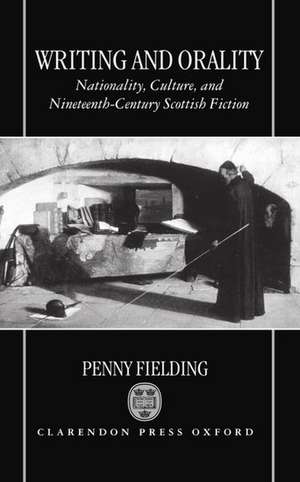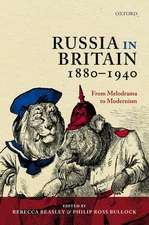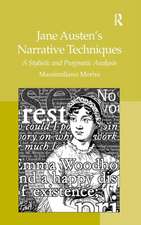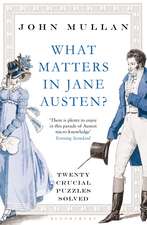Writing and Orality: Nationality, Culture, and Nineteenth-Century Scottish Fiction
Autor Penny Fieldingen Limba Engleză Hardback – 6 iun 1996
Preț: 1209.59 lei
Preț vechi: 1844.90 lei
-34% Nou
Puncte Express: 1814
Preț estimativ în valută:
231.51€ • 240.64$ • 191.77£
231.51€ • 240.64$ • 191.77£
Carte tipărită la comandă
Livrare economică 24-30 ianuarie 25
Preluare comenzi: 021 569.72.76
Specificații
ISBN-13: 9780198121800
ISBN-10: 0198121806
Pagini: 264
Dimensiuni: 146 x 224 x 20 mm
Greutate: 0.48 kg
Ediția:New.
Editura: Clarendon Press
Colecția Clarendon Press
Locul publicării:Oxford, United Kingdom
ISBN-10: 0198121806
Pagini: 264
Dimensiuni: 146 x 224 x 20 mm
Greutate: 0.48 kg
Ediția:New.
Editura: Clarendon Press
Colecția Clarendon Press
Locul publicării:Oxford, United Kingdom
Recenzii
Penny Fielding's Writing and Orality is a highly stimulating and accomplished contribution to work in this field, and to the study of nineteenth-century Scottish fiction. Succinctly written and lucidly developed, its range is broad - as the title suggests - but its details are finely rendered and its interpretations acute ... both theoretically and historically informed, often with an impressive grasp of detail and an eye for the unusual text ... It will be required reading for anyone interested in nineteenth-century Scottish literature and in more general questions about literature's engagement with its spoken other.
This is a complex psychological terrain, and it is an additional virtue of Penny Fielding's subtle and entertaining approach that she keeps several strands of argument in play while maintaining a judicious balance between their competing claims on attention. In her specific readings, the intricate weave of orality with literacy produces insights that traverse the public and private, from literary character to the character of culture.
a very thoughtful study ... persuasive, copious of detail, and not reductive ... Often brilliant in its textual analysis, and always clearly and effectively written, it is a welcome addition to studies in this area.
This is a book that seeks to challenge the fundamental speech/writing opposition of Western culture by demonstrating the ways in which morality functions.
wide-ranging study of the concept-function of orality in nineteenth-century Scottish literary culture
This is a very good book which adds greatly to our understanding of the relationship between written and oral forms, and their mutual, though often uncomfortable dependence on each other. At the same time it provides an original and highly informative account of one of the themes which gave shape to the development of the Scottish nineteenth-century novel. Finally, and not least of all, Writing and Orality is often as entertaining as the stories it discusses and a constant pleasure to read.
This is a highly accomplished study ... Her wide-ranging chapters surveying the currents of orality and literature in the nineteenth century contain some of the best material in the book, though they are surpassed by the analyses of Oliphant's short stories. Fielding deserves particular credit for her theoretically aware appreciation of Oliphant's important late work ... This is Fielding's first book and an impressive debut. Few critics have written so well about the authorial power of Stevenson and Oliphant, and no one has written so well about speech and textuality in their work. I hope Fielding's next book will be even more ambitious in scope, and that it will come soon.
This is a complex psychological terrain, and it is an additional virtue of Penny Fielding's subtle and entertaining approach that she keeps several strands of argument in play while maintaining a judicious balance between their competing claims on attention. In her specific readings, the intricate weave of orality with literacy produces insights that traverse the public and private, from literary character to the character of culture.
a very thoughtful study ... persuasive, copious of detail, and not reductive ... Often brilliant in its textual analysis, and always clearly and effectively written, it is a welcome addition to studies in this area.
This is a book that seeks to challenge the fundamental speech/writing opposition of Western culture by demonstrating the ways in which morality functions.
wide-ranging study of the concept-function of orality in nineteenth-century Scottish literary culture
This is a very good book which adds greatly to our understanding of the relationship between written and oral forms, and their mutual, though often uncomfortable dependence on each other. At the same time it provides an original and highly informative account of one of the themes which gave shape to the development of the Scottish nineteenth-century novel. Finally, and not least of all, Writing and Orality is often as entertaining as the stories it discusses and a constant pleasure to read.
This is a highly accomplished study ... Her wide-ranging chapters surveying the currents of orality and literature in the nineteenth century contain some of the best material in the book, though they are surpassed by the analyses of Oliphant's short stories. Fielding deserves particular credit for her theoretically aware appreciation of Oliphant's important late work ... This is Fielding's first book and an impressive debut. Few critics have written so well about the authorial power of Stevenson and Oliphant, and no one has written so well about speech and textuality in their work. I hope Fielding's next book will be even more ambitious in scope, and that it will come soon.














